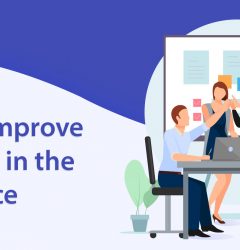22 Sep

Did you know? Despite known facts that a mature project management process makes a company significantly more likely to execute on time and within budget, just 46% of firms make project management a cultural priority.
If you work for a company that creates technology products (or simply owns a lot of digital properties), chances are you have a “project manager” on your technical team.
As that individual rushes between workstations, using abbreviations you don’t recognize and speaking easily in tech words that seem like a foreign language, this might appear that their work has nothing to do with your function in HR. But you would be wrong because risk management is a project management word that every human resources professional is familiar with.
That is, after all, what project managers do. They reduce project risk by controlling the full process from inspiration to planning to development to execution and rollout. That is also very similar to what a successful HR staff performs. They manage people’s risks to ensure that everyone in the organization has a productive, supportive, and enjoyable career.
Table of Contents
What is HR Project Management?
HR Project management is a component of project management that is primarily concerned with the organization, management, and leadership of a project team. Everyone who has been allocated duties and responsibilities for completing the project is part of the team.
Project managers give unique options and challenges because they bring together employees from several functional departments in new responsibilities and relationships. An individual with hardly any management experience can take charge of a project phase, delegating power to more senior personnel.
A specific topic expert is sometimes asked to comment on marketing and budget decisions. With good management, these new team characteristics can give possibilities for development and improve project outcomes.
HR project management is a type of project resource management that is part of a comprehensive project management strategy.
Why is HR Project Management Critical?
HR employees are often not accustomed to planning and coordinating formal initiatives beyond their area. However, most of the work employees perform daily can be classified as projects or micro-projects.
Planning and implementing employee recruitment and training programs, conducting employee engagement surveys, and performing annual or quarterly performance and compensation evaluations are all typical assignments for HR teams.
HR is also frequently tasked with managing workplace operations, arranging team-building events, and establishing employee benefits packages. These duties are difficult and need a thorough understanding of project management best practices.
HR professionals have also gotten more involved in organization initiatives throughout the years. HR leaders, for example, are frequently part of the c-suite key point to note with making crucial decisions on problems such as business culture, employee salaries, diversity challenges, and so on. HR experts that are skilled in project management would be an advantage in organizing or even leading such essential sessions.
Aside from providing you with the necessary leadership abilities to guarantee the successful operation of various projects, having the necessary project management skills can also help you minimize project costs, decrease risks, maximize resources, and enhance overall project efficiency.
Benefits of HR Project Management
There are numerous benefits of HR project management; let’s check out some of the benefits of HR project management:-
1. Improved Cooperation
Encouraging staff to “work together” is difficult to provide the intended results, which is when a project manager and project management plan might help.
When all responsibilities within the initiative are strictly established, team members’ communication becomes easier and more effective. You avoid uncertainty regarding who is in charge of specific duties.
This is especially important for initiatives that involve the participation of two or even more departments. HR and IT, for example, might even be involved in the introduction of a new careers website. A recruiting drive would need the involvement of both HR and the marketing staff.
Sales and advertising are two departments that frequently engage on projects simultaneously, whether it’s introducing a new product or striving to fulfill sales objectives; however, there is often a mismatch between these teams. However, when sales and advertising teams collaborate well, it leads to expansion and improved corporate productivity.
2. Economic Resource Utilisation
Project management in HR gives a thorough perspective of each project and its objectives, allowing you to choose where and when you should invest limited resources, such as time and money. This enables HR teams to commit to a budget and timeline while utilizing resources in the most effective manner.
3. Maintaining Concentration and Consistency
Project management is based on identifying goals and managing a team to achieve those objectives. When objectives are defined and divided into smaller, achievable tasks, group members remain motivated and concentrated because they know what they’re actively trying for.
4. Consistently Improving And Actively Managing Workflow
A clear knowledge of all duties, together with a Network diagram, helps everyone involved in the project manage their workflow, and accessible methods allow for enhanced productivity and efficiency.
HR teams frequently work on many essential projects at the same time; hence, project management skills and processes can enhance productivity throughout the firm. For example, a Canadian bank introduced agile project delivery practices to its HR staff, which improved talent distribution and increased productivity by over 30%.
HR Project management approaches also promote and enable the use of time management and monitoring technologies to assess a team’s productivity, which might also assist estimate how longer future jobs will take more precisely and identify something over or underachieving staff.
5. Looking at the Big Picture
When working with disagreements or a lack of resources, having a clear understanding of timetables and progress allows HR to inform leadership frequently on project status and obtain significant insight into team goals.
HR experts can identify how the objectives of the project match with wider corporate objectives and communicate this to the leadership team.
6. Increasing Efforts in Recruitment And Enrolling
HR Project management will also help with new staff recruitment and orientation. HR Project management using agile concepts can result in creative recruiting efforts and a boost in the number and variety of candidates, new workers starting their employment with the appropriate training and just being properly qualified to deliver, and greater talent utilization across the firm.
This also benefits HR in gaining a place at a table with corporate executives by clearly demonstrating the direct advantages of HR project management to the last line.
Helpful Tips for Efficient Project Management in HR
Most organizations aim for extremely valued talents in their executives and staff, including project management. Managing or supervising a project is not usually the responsibility of the project manager.
In fact, a skilled project manager will occasionally delegate leadership tasks to their young team members by leading them through various assignments and tasks. Here are some suggestions to help you develop crucial project management skills.
1. Make Data-Driven Decision Making a Priority
Sensible decision is at the center of any successful HR Initiative. If you want to unite your employees and encourage them to succeed, you should depend on established approaches and strategies rather than feelings and emotions, and assumptions.
You should use business intelligence for data discovery and visualization, wherever feasible, in order to obtain valuable intelligence to drive crucial project choices. You can assist your team in improving operations while saving time and resources invested on less useful tasks and procedures by depending on smart and comprehensive data methods.
2. Maintain Innovative Risk Management
Recognizing, assessing, and reacting to risks that exist at any point during the project’s duration is what risk management comprises.
An effective risk management plan will reserve the resources necessary to react to the danger as promptly as possible. This could also include having more staff to deal with an issue or having the required equipment to prevent specific hazards from spreading or progressing.
The difficulties encountered will almost always vary depending on the complexity and nature of the task at hand. For example, losing a skilled worker or becoming the victim of a large cyberattack may be devastating to the honesty and success of your internal operations.
To ensure that possible risks are discovered, prioritized, and minimized, managers should select risk owners to supervise a segment of the overall project. This is a significant risk ownership approach that should be included in your entire risk-management plan.
3. Prepare A Solid Plan
Any project necessitates thorough preparation to be successful. The advantage of preparing your initiatives ahead of time is that you have some influence over the consequences.
This offers you the comfort and confidence you need to form outstanding teams and enable them to face any problems that arise. Always start with the problem at hand while creating a plan. The idea is to construct a layout that will guide you in navigating all of the activities and problems you are likely to face.
After coming up with a strategy, you should write out your goals and objectives. It’s also a good idea to lay out some strategies for achieving your objectives. It is also essential to provide roles and tasks to teams. Professionals should be assigned responsibilities in which their talents and knowledge can assist the team members and the project together as a whole.
4. Concentrate on Your Team
To guarantee that the major project objectives are realized, every project relies on the contribution of all team members. An initiative can only be considered successful if the teams involved are engaged and motivated to complete their allocated duties.
To achieve this degree of interaction and coordination, you should prioritize your employees. One method is to provide them with the resources and assistance they require to accomplish.
Another approach is to make your team members feel appreciated and valued and to make their contributions to the project meaningful. Their duties and efforts should also be consistent with their basic beliefs and principles.
Similarly, stay productive by giving many jobs to one person or swapping them mid-project. This can lead to team disengagement, which can be disastrous.
How to Develop an HR Management Plan?
A team management plan consists of a number of components and steps, so we’ll take a look at how to create one.
1. Discuss the Strategy
A formal HR project management plan begins with an introduction that explains the plan’s objective, what it covers, and the way the team should use it to able to improve and keep the project running smoothly.
2. Allocate Duties and Responsibilities
Establishing defined roles and duties is essential for project success. To do so, analyze the skills and manpower required to perform each particular project and design a framework for the associated workforce.
Members of the team are often classified as follows:
- Project manager: Oversees all parts of a project, from planning to implementation, and is ultimately accountable for its accomplishment or failure.
- Sponsor of the project: Authorizes and finances the project, campaigns for it, authorizes adjustments, and formally accepts outcomes.
- Stakeholders: Evaluate the scope of the project and objectives and engage actively in project management as stakeholders.
- Line managers: Line managers take part in planning, supply resources, and personnel, and supervise operations within their project area.
- Team members: Directly provide effort or skills to the project.
The project manager allocates a position to each member of the team based on their competency, responsibilities, and jurisdiction over the project.
A typical organizational chart, a basic text document, a matrix of responsibility assignment (RAM), or a mix of the three can be used to depict these roles and duties.
3. Create A Workforce Management Strategy
This stage of the planning process guarantees that everyone on whom you rely on getting your project going is available and ready to work whenever the time comes. You should explain all elements of project employment, including:
- Exactly when and how will new employees be hired
- All throughout the project, each crew member’s time needs
- Exactly when and how will expertise be improved as required
- How will performance evaluations be conducted?
- How will outcomes be acknowledged and rewarded?
- In what circumstances will team members be relieved from the project?
- The project’s security and regulatory requirements
HR software might help with this stage of project management by giving information on time and participation, training, employee credentials, capabilities, and other important HR obligations.
4. Development and Training of the Team Members
A project manager should think about approaches to enroll project team members and then get them working successfully collaboratively, especially in addition to capacity building.
This could also involve a project overview or team-building activities to connect members of the team who are working with each other for the first time.
Certain team members might require additional training to use additional capabilities and other project-related technologies. As the project proceeds, the project manager might well be required to give individual mentoring, resolve conflict, and provide feedback to ensure that everyone is working efficiently for the benefit of the entire team.
5. Acknowledgment And Rewards
Employees are frequently required to move beyond their comfort zone and learn or put in extra effort in order to keep a project on pace. Acknowledging their efforts and achievements informally helps keep the team engaged and offers documentation of their work for upcoming projects.
Why should Organizations use HR Project Management?
Although HR professionals might not be familiar with developing and overseeing formal projects, many of the tasks they perform are in real projects.
HR initiatives include, for example, recruiting new people, developing and implementing training and development programs, and completing yearly performance and compensation reviews. Here are some more HR project examples:
- Programs for recruiting interns
- Getaway and kick-off planning
- Organizing team-building activities
- Programs for training and development
- Management of workplace activities
- Improving virtual introduction for widely separated teams
Every one of these long-term HR tasks can benefit from using traditional project management methods, techniques, and tools to reduce risk and boost success.
Human resource professionals are becoming increasingly involved in organizational-wide projects. Several departments and multidisciplinary teams are involved in several strategic initiatives. An HR employee could be invited to participate in any internal initiative that may have an influence on how employees operate or business culture.
They can also be hired to assist with the staffing of a project team, mentoring team members, assisting with interactions, or developing training plans and programs. For example, if the IT team is building new software for the organization to utilize, HR may be requested to assist in establishing the user adoption training strategy.
As HR professionals are progressively required to collaborate on and manage projects, they should always be equipped with the necessary project management tools, skills, and expertise to assure success.
Wrapping It Up
Even if you don’t use the whole HR project management strategy, you can incorporate some of its components, such as project scoping, project status conferences, and incorporating assessments into your business. HR Project management contributes to more effective and productive ways of working and, as a result, enhances the likelihood of completing any project successfully.
Frequently Asked Questions (FAQs)
1. Is it possible that certain projects are too small for project HR management?
Certain projects with small teams might not require formal team planning.
However, all human resource initiatives can benefit from HR project management concepts such as distinct roles and responsibilities, tasks assigned to particular employees and key schedules, and enough resources and encouragement for your team.
2. Which is More Effective: Human Resource Management or Project Management?
Whereas both human resources and project management involve people management abilities, human resources management extends far beyond dealing with individual employees.
Many components of human resources have little to do with employee engagement, despite the fact that employee engagement is a fundamental component of project leadership.












Himani